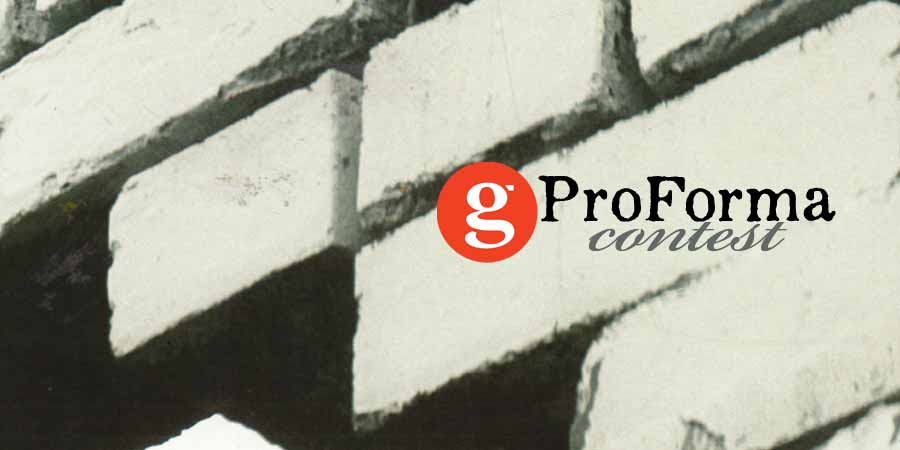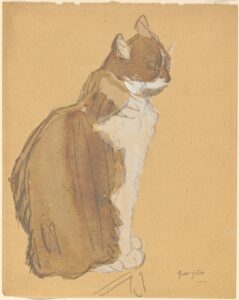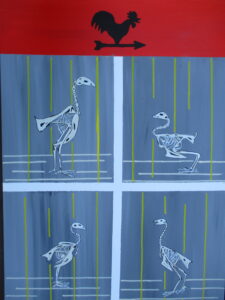PROFORMA CONTEST

ABOUT THE CONTEST
Every summer, Grist welcomes submissions of unpublished creative work for our ProForma contest in fiction, creative nonfiction, poetry, and/or hybrids that explore the relationship between content and form. Our contest is open to all forms of literary expression.
“Pro forma” often means an established way of doing things. For the contest, we look for work that makes the most of its form, whether that’s an essay that breaks from traditional expectations, a set of poems from a sonnet sequence, a short story that blends or bends its genre, a hybrid text or a genre-less piece. However you define the relationship with form in your writing, we want to see your best work.
PRIZES
First Prize: $1,000 plus publication in the print journal
Runners Up: publication online (along with normal payment rates)
ENTRY
Contest entry fee: $20 (includes one back issue of Grist)
For longer works: no more than 5000 words
For shorter works: no more than 5 pieces
Reading will be done anonymously, so please remove your name or any other identifying information from both the file name and the manuscript itself. Otherwise, we will be unable to consider it. Simultaneous submissions are fine, but please notify us if the submission is accepted elsewhere. Multiple submissions are also fine, but you will be charged the full reading fee per submission. We cannot refund the fee if the submission is withdrawn. No one currently or recently affiliated with the University of Tennessee is eligible to enter. Additionally, former students of our final judge and close associations of current Grist staff are also ineligible. All submissions will also be considered for publication outside of the contest feature.
IMPORTANT NOTE
Please indicate in the comments section on Submittable if your manuscript should be considered in a certain way (if three flash pieces or poems should be grouped together rather than read as separate pieces, for example).
SUBMISSIONS WINDOW
Submissions open: June 1, 2025, 12:01 EST
Submission deadline: July 15, 2025, 11:59 EST
Please submit your manuscript through the Submittable link above.
Issue 17 Winners
(Selected by Destiny O. Birdsong)
Christina Craigo (first place) for her work Prunus Alleghaniensis
“Whether the inferno is literal or metaphorical, there is nothing quite like a burning house, and ‘Prunus Alleghaniensis’ offers us both in three short, breathtaking vignettes told by a wife, daughter, and finally, the betrayed husband. The voices here are powerful, the observations keen, and each person’s reaction to the blaze speaks to their level of real or imagined culpability. I also love a story that ends without ending, and the father’s last sentence leaves us in a chasm of pain, grief, and uncertainty. This is a feat of short storytelling, where a world is built three times, then torn asunder in only a handful of pages. Remarkable.” – Destiny O. Birdsong, Judge
Jen Karetnick (runner up) for A Framed Sestina for the Genetics of Forgetting
Jeni Prater (runner up) for Sperm BOGO
CONTEST JUDGING

Beth Ann Fennelly, a 2020 Academy of American Poets Laureate Fellow, was the poet laureate of Mississippi from 2016-2021 and teaches in the MFA Program at the University of Mississippi. She’s won grants and awards from the National Endowment for the Arts, the United States Artists, a Pushcart, and a Fulbright to Brazil. Fennelly has published three books of poetry and three of prose. Her seventh, The Irish Goodbye: Micro-Memoirs, is forthcoming from W. W. Norton. She lives with her husband, Tom Franklin, and their three children in Oxford, MS. Learn more at https://www.bethannfennelly.com/
CODE OF CONDUCT
 We adhere to the Council of Literary Magazines and Presses’ Contest Code of Ethics:
CLMP’s community of independent literary publishers believes that ethical contests serve our shared goal: to connect writers and readers by publishing exceptional writing. We believe that intent to act ethically, clarity of guidelines, and transparency of process form the foundation of an ethical contest. To that end, we agree to 1) conduct our contests as ethically as possible and to address any unethical behavior on the part of our readers, judges, or editors; 2) to provide clear and specific contest guidelines—defining conflict of interest for all parties involved; and 3) to make the mechanics of our selection process available to the public. This Code recognizes that different contest models produce different results, but that each model can be run ethically. We have adopted this Code to reinforce our integrity and dedication as a publishing community and to ensure that our contests contribute to a vibrant literary heritage.
We adhere to the Council of Literary Magazines and Presses’ Contest Code of Ethics:
CLMP’s community of independent literary publishers believes that ethical contests serve our shared goal: to connect writers and readers by publishing exceptional writing. We believe that intent to act ethically, clarity of guidelines, and transparency of process form the foundation of an ethical contest. To that end, we agree to 1) conduct our contests as ethically as possible and to address any unethical behavior on the part of our readers, judges, or editors; 2) to provide clear and specific contest guidelines—defining conflict of interest for all parties involved; and 3) to make the mechanics of our selection process available to the public. This Code recognizes that different contest models produce different results, but that each model can be run ethically. We have adopted this Code to reinforce our integrity and dedication as a publishing community and to ensure that our contests contribute to a vibrant literary heritage. Read Online Content

Prunus Alleghaniensis
Brung up in West-by-God Virginia, Christina Craigo earned BFA and MFA degrees in painting and fine arts in Philadelphia and New York City. After a few decades of teaching, making, and exhibiting art (including a year in India supported by the Fulbright Foundation), she earned an MBA degree and took a more active role in managing a family business. She settled in Boulder, Colorado, and her creative inclinations shifted to writing fiction. Her work has appeared or is forthcoming in Exposition Review, Hobart, Eclectica, Post Road, and Pembroke Magazine. She is seeking representation for her first novel and developing a second. For more information, please visit christinacraigo.com.

We Open on a Field
Michaela Brown is a Midwest transplant currently teaching English in Vigo, Spain. She is the first place recipient of the 2020 Marjorie Stover Short Story Prize and has previously been published in Unstamatic Magazine, Gone Lawn, The Daily Drunk, and elsewhere. You can find her on Twitter @mikienbrown.

Parable of Sparrow and Crocodile
Originally from the DC area, Matthew Moniz has poems appearing in or forthcoming from The Iowa Review, Notre Dame Review, Crab Orchard Review, Meridian, Tupelo Quarterly, Fourteen Hills, and minnesota review. His work has been awarded Poetry by the Sea’s Kim Bridgford Memorial Sonnet Crown Contest prize and the SCMLA Poetry Prize.

ABOUT THE CONTEST
Every spring, Grist welcomes submissions of unpublished creative work for our ProForma contest in fiction, creative nonfiction, poetry, and/or hybrids that explore the relationship between content and form. Our contest is open to all forms of literary expression.
“Pro forma” often means an established way of doing things. For the contest, we look for work that makes the most of its form, whether that’s an essay that breaks from traditional expectations, a set of poems from a sonnet sequence, a short story that blends or bends its genre, a hybrid text or a genre-less piece. However you define the relationship with form in your writing, we want to see your best work.
PRIZES
First Prize: $1,000 plus publication in the print journal
Runners Up: publication in the print journal (along with normal payment rates)
ENTRY
Contest entry fee: $20
For longer works: no more than 5000 words
For shorter works: no more than 5 pieces
Reading will be done anonymously, so please remove your name or any other identifying information from both the file name and the manuscript itself. Otherwise, we will be unable to consider it. Simultaneous submissions are fine, but please notify us if the submission is accepted elsewhere. Multiple submissions are also fine, but you will be charged the full reading fee per submission. We cannot refund the fee if the submission is withdrawn. No one currently or recently affiliated with the University of Tennessee is eligible to enter. Additionally, former students of our final judge and close associations of current Grist staff are also ineligible. All submissions will also be considered for publication outside of the contest feature.
IMPORTANT NOTE
Please indicate in the comments section on Submittable if your manuscript should be considered in a certain way (if three flash pieces or poems should be grouped together rather than read as separate pieces, for example).
SUBMISSIONS WINDOW
Submissions open: March 15, 2023, 12:01 EST
Submission deadline: April 30, 2023, 11:59 EST
Please submit your manuscript through the Submittable link above.
Issue 15 Winners
(Selected by Kayleb Rae Candrilli)
Whitney Collins (first place) for her work Cray
“It is rare to be so fully re-immersed in the dissolved friendships of our childhood. Rare to be pulled back so forcefully into some of the most tangible losses of our lives. “CRAY” is a powerful vacuum of both love and loss, that stings with unimaginable familiarly. That cuts with the painful serration of a too-old steak knife. It is brilliant. Haunting, of course. And brimming with tenderness, hurt, raw adoration, and an astute sub-textual pulse of a child beginning to understand the scope and unshakable weight of socioeconomics and ridged castes. I am truly awed. When reading this story, I remembered my life and all I buried.” –Kayleb Rae Candrilli, contest judge
Caitlyn Curran (runner up) for The Land of Ordinary Violence and other poems
Alysse McCanna (runner up) for Crown for Forgetting
CONTEST JUDGING

Destiny O. Birdsong is a poet, novelist, and essayist whose work has appeared in the Paris Review Daily, African American Review, and Poets & Writers, among other publications. Destiny has won the Academy of American Poets Prize and has received support from Cave Canem, Callaloo, Jack Jones Literary Arts, Pink Door, MacDowell, The Ragdale Foundation, and Tin House. Her debut poetry collection, Negotiations, was published in 2020 by Tin House and was longlisted for the 2021 PEN/Voelcker Award. Her debut novel, Nobody’s Magic, was published in February 2022 from Grand Central Publishing, was longlisted for the Center for Fiction’s First Novel Prize, a finalist for the Ernest J. Gaines Award for Literary Excellence, and won the 2022 Willie Morris Award for Southern Fiction.. During July 2022, she was the Hurston-Wright Foundation’s inaugural Writer-in-Residence at Rutgers University-Newark, and she now serves as a 2022-23 Artist-in-Residence at the University of Tennessee in Knoxville.
CODE OF CONDUCT
Grist is committed to diversity, inclusivity, cultural interchange, and respect for all individuals. In the case of all submitted and/or accepted work, if an author behaves or speaks publicly—or is revealed or accused to have behaved or spoken, even in private—in ways that contradict these expressed values of the journal, then we reserve the right to disqualify an author’s submission, release the author from any contract, and/or remove their work from our archives.

We adhere to the Council of Literary Magazines and Presses’ Contest Code of Ethics:
CLMP’s community of independent literary publishers believes that ethical contests serve our shared goal: to connect writers and readers by publishing exceptional writing. We believe that intent to act ethically, clarity of guidelines, and transparency of process form the foundation of an ethical contest. To that end, we agree to 1) conduct our contests as ethically as possible and to address any unethical behavior on the part of our readers, judges, or editors; 2) to provide clear and specific contest guidelines—defining conflict of interest for all parties involved; and 3) to make the mechanics of our selection process available to the public. This Code recognizes that different contest models produce different results, but that each model can be run ethically. We have adopted this Code to reinforce our integrity and dedication as a publishing community and to ensure that our contests contribute to a vibrant literary heritage.

